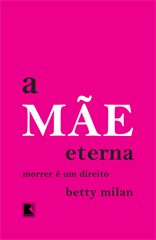
excerpt
If I could give you life again… have you born from me the way I was born from you… I never stop wishing for the impossible. Even though you’re 98, I can’t bear to lose you. I, one who knows about the end of everything, can’t accept your end. What’s the point of reading the Buddhists and knowing that everything changes, “causes and conditions vary continously”? That life is “a flow of creation, transformation, extinction and nothing is permanent”? I know that only impermanence makes the renewal of the universe possible; the heart doesn’t follow the head, though.
synopsis
At 98 years of age, the mother is almost blind, almost deaf, can hardly walk and eats like a bird. In the impossibility of conversing with this mother, the daughter-narrator writes to an imaginary mother, talking about her drama. She does this with a view to bearing the physical devastation, lack of communication and, even more so, to elaborate on the loss of a parent even before death.
In her reflections, she recalls the past of a combative women, ready for anything, who, on becoming a widow, took over her husband’s company and began to read and re-read his love letters. The same letters that, because she is 98 and unable to see well, her daughter reads to her. Despite her age, however, this mother remains sharp and does exactly what she wants to do. She “puts one over” on anyone trying to control her with advice about doctors, medication, and food, and with this, continually feeds the humor of the narrative.
Thinking about her mother’s condition, the daughter asks herself when life should be prolonged and questions the conduct of the doctor who tries to beat death at any price. A text about love and separation, which raises questions that are fundamental nowadays: How to face extreme old age? Is it a doctor’s place to beat death? How to humanize the end of life?
history
The book was first launched in São Paulo, in the presence of doctors, psychoanalysts, journalists, writers, critics and actors, as well as friends and family. The book’s muse, Dona Rosa, 98 years old, was also presente (pictures).. The second launch was in Rio de Janeiro, at Livraria Travessa, where a debate took place with the presence of the writer, literature professor Deonísio da Silva and psychoanalysts Teresa Palazzo Nazar and Marco Antonio Coutinho (pictures)..
Also in São Paulo, the author presented the book in Academia Paulista de Letras – APL, once more with the presence of D. Rosa (pictures).. The third launch was held in Lisboa, Portugal. It took place in the Brazilian Embassy. Carlos Kessel (First Secretary of the Embassy), the writer Teolinda Gersão and the psychanalist Maria Belo joined the launch (pictures)..
The writer gave numerous interviews and the press published several favorable reviews. The first edition comprised 8000 copies and the book was on the bestseller list and it is now going to be published by Penguin in Portugal and in Spain by Maresia.
opinion
An account startling for its delicacy and also the frankness with which the author narrates the passage from daughter to mother’s mother.
Fernanda Torres
There are violent declarations and there are delicate declarations. This book’s is delicate, despite the difficult theme. I read it with rapture and emotion. I liked it very much and believe that thousands of readers will feel the same.
Mario Sabino
An ambivalent, highly interesting book about life at a hundred years of age.
Roberto Schwarz
A very beautiful book, contained and unsentimental…one sees a familiar, yet universal, timeless world.
Teolinda Gersão
A beautiful novel! It is going to run the world, through land and time.
Luiz Fernando Ramos
There is something of eternity in the abiss of mother’s clingness, sublime slavery which does not die with death.
Richard Prieur
areas of interest
Literature, Psychoanalysis.
critical reaction
A mãe eterna (The eternal mother), by Betty Milan
Claudio Willer
where to purchase
Livraria Cultura (portuguese – printed) | Saraiva (portuguese – printed) | Amazon (portuguese – e-book)


